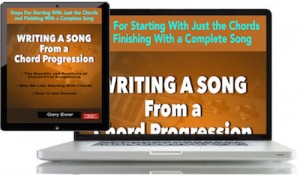I’ve frequently written about the value of writing music that sounds like your songwriting hero, but it begs an important question: Aren’t you just running the risk of plagiarizing something they’ve written?
And it begs a second more important question: Why is that even good advice? Why would you write to purposely sound like someone else?
 Do you find that writing hooks is slowing up your songwriting process? Time to read “Hooks and Riffs: How They Grab Attention, Make Songs Memorable, and Build Your Fan Base.” Get it separately, or as part of “The Essential Secrets of Songwriting 10-eBook Bundle.
Do you find that writing hooks is slowing up your songwriting process? Time to read “Hooks and Riffs: How They Grab Attention, Make Songs Memorable, and Build Your Fan Base.” Get it separately, or as part of “The Essential Secrets of Songwriting 10-eBook Bundle.
To deal with the first question: No, you won’t be plagiarizing. I’m talking about copying a style of composition (perhaps even performance), not actual melodies or lyrics.
To deal with the second question: Deliberately trying to sound like someone else frees you up from focusing on your own problems, and lets you concentrate on how someone else would theoretically assemble your ideas. It allows you to focus on someone else’s technique in a general sort of way, and think about what makes someone else successful.
When you listen to interview with some of the world’s most influential singer-songwriters, you’ll find that most of them continuously cite instances when the music they wrote was a deliberate attempt to sound like another successful artist.
Here are some tips for copying the pros:
- Choose songwriters worth copying. You’ll want to identify the writers who have a track record for excellence, who show a distinctive style as a solo writer.
- Don’t necessarily limit who you choose to today’s songwriters. It may surprise you how much you can learn by identifying and copying stylistic qualities of songwriters from 20 or 30 – or even more — years ago.
- Try to identify why they’re successful. Listen to several good examples of your chosen hero’s music, and ask yourself what it is that has made them successful. Try to focus on specific song elements — melody, backing rhythm, lyrics, chords, as well as general performance qualities — and ask yourself, “What makes it work?”
- Add your own touch to the songs you write. If you write a song that sounds, let’s say, like your hero Justin Vernon (Bon Iver), you may find that your temptation is to perform it in his voice, with his same penchant for slower, pensive tempos. So once you’ve written the song, it’s now time to think about what you would typically do with a song. The song is written, so do a performance that makes you feel comfortable.
- Use listening as a tool for inspiration. Take half a day and immerse yourself in the music of someone else as a prep for writing. You’ll find that listening is a great way to feel creative, and you’ll find the feeling of inspiration you get will make you want to grab your pencil and start working.
 Written by Gary Ewer. Follow Gary on Twitter
Written by Gary Ewer. Follow Gary on Twitter
 Like starting the songwriting process by working out the chords first? There are benefits and dangers. Read “Writing a Song From a Chord Progression” to get this process working properly for you.
Like starting the songwriting process by working out the chords first? There are benefits and dangers. Read “Writing a Song From a Chord Progression” to get this process working properly for you.










